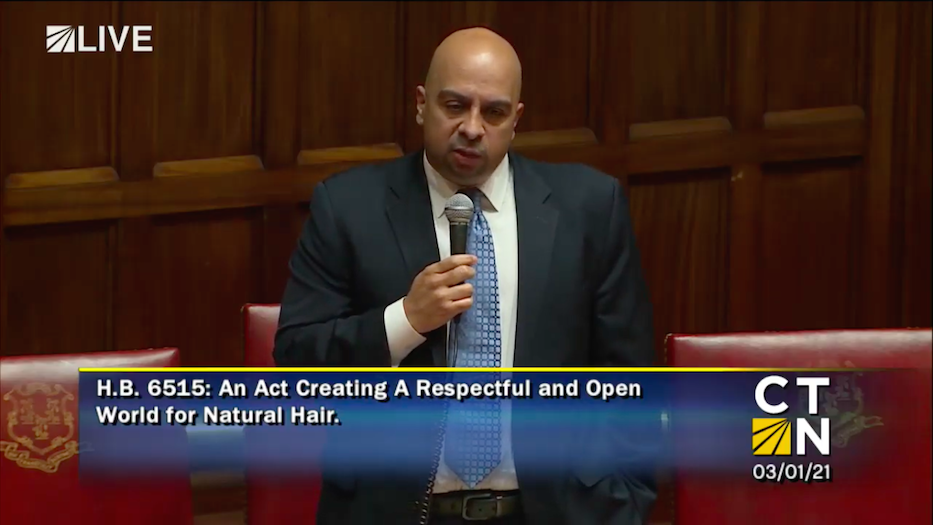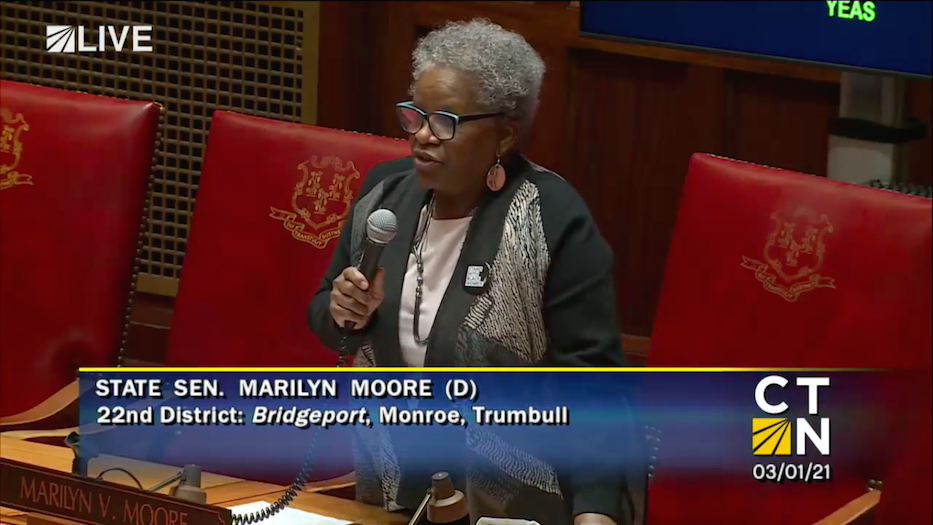
Culture & Community | Legislative Agenda | Arts & Culture | State Legislature | COVID-19 | Arts & Anti-racism
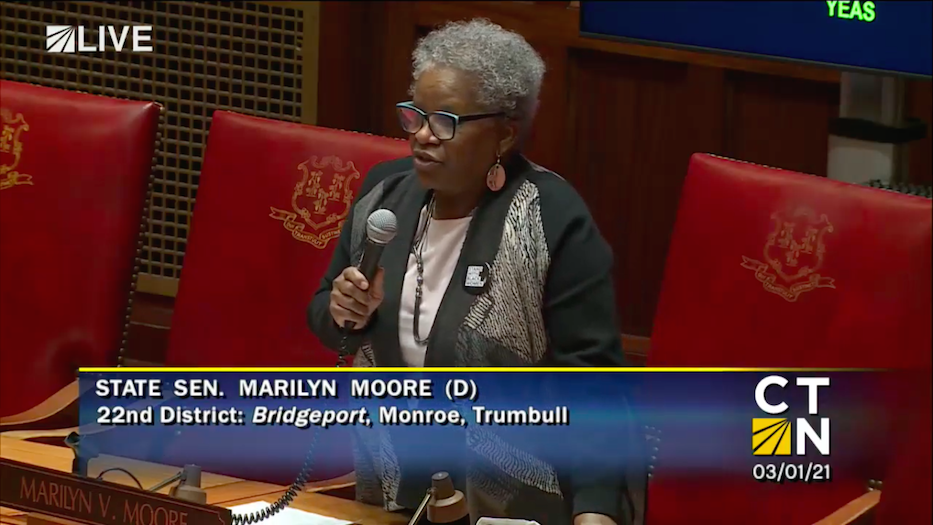
State Sen. Marilyn Moore was in nursery school the first time a teacher objected to her natural hair. This week—nearly seven decades later—she learned about a 19-year-old constituent who had been told to hide her locs under a hat, or lose her restaurant job.
Monday evening, Moore shared that story with colleagues as proposed CROWN Act legislation passed unanimously out of the Connecticut Senate. The bill, which passed 139-9 in the Connecticut House of Representatives last week, now moves to Gov. Ned Lamont. Lamont has been extremely supportive of the legislation and is expected to sign it into law.
“This is about more than being Black,” Moore said Monday. “This is about people who are in a dominant culture who want to keep people in a certain place. The real issue that’s brought to this point is the desire of oppressors to deny Black people, and Brown people, their culture.
The CROWN Act is a national legislative movement that stands for Creating A Respectful And Open World for Natural Hair. In Connecticut, the bill would add natural hairstyles to protected classes that are included in statewide anti-discrimination laws, as overseen by the Connecticut Commission on Human Rights and Opportunities. Those include locs, weaves, box braids, bantu knots, twists, afros, afro puffs, wigs, and head wraps.
Proposed by New Haven State Rep. Robyn Porter and Danbury State Sen. Julie Kushner, it recognizes that hair-based discrimination is often used as a proxy for anti-Blackness in schools and in the workplace. Connecticut will be the eighth state in the country to with CROWN Act legislation on the books; other states include California, New York, New Jersey, Maryland, Virginia, Washington and Colorado. As of this year, CROWN Act legislation has also been proposed in 19 other states. Read more about that here.
"This will be the first bill that we pass in this session that will be intentionally directed toward fighting racism. But I have to say, I hope it's not the last," Kushner said Monday. "I think particularly this year, this year where we as a country mourned after the murder of George Floyd. This year after we pledged to be better anti-racists. This year that we pledged to attack systemic racism. It is incredibly important that today, we pass the CROWN Act."
Monday evening, legislators brought a mix of personal stories, global history, and policy to the floor. Many looked to a 2019 study by Dove that concluded that Black women are 80 percent more likely than their white and non-Black colleagues to change their hair to conform to workplace expectations, and 1.5 times more likely to be sent home or to know another Black woman who was sent home due to hair-based discrimination.
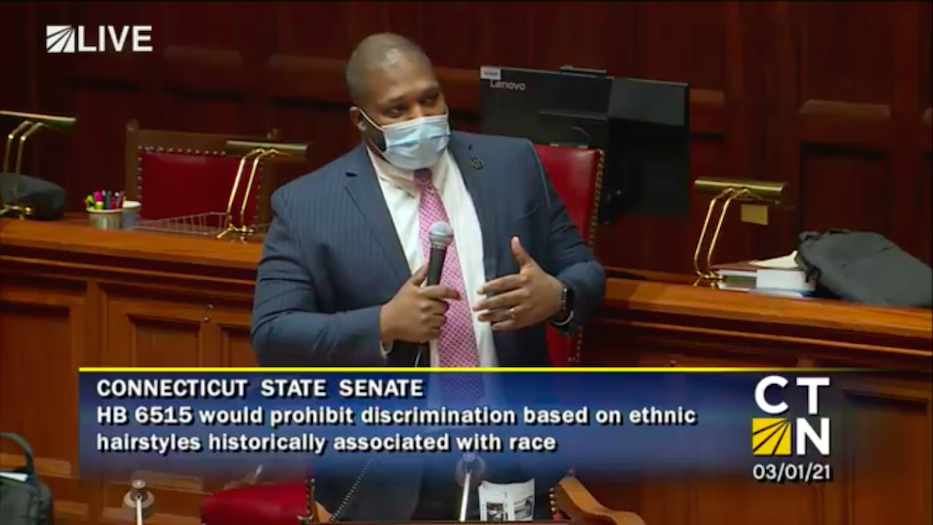 Moore, who represents Bridgeport, began her remarks with her own experience of hair discrimination, which started when she was just a child. When Moore was in nursery school, her teacher sent home an image of a Black child in the bathtub with a bone running through her hair. Moore, who was just a few years old, liked the teacher. She didn’t understand why her mother became furious, and then threw the photo in the trash.
Moore, who represents Bridgeport, began her remarks with her own experience of hair discrimination, which started when she was just a child. When Moore was in nursery school, her teacher sent home an image of a Black child in the bathtub with a bone running through her hair. Moore, who was just a few years old, liked the teacher. She didn’t understand why her mother became furious, and then threw the photo in the trash.
She understood it a few years later, when a stylist tried to chemically straighten her hair. By then, Moore was in the eighth grade, and rocking tight curls that ultimately became “one of the baddest fros you ever want to see” by the 1960s. Her father had just passed away. Her mother objected again: the stylist could not put chemicals on her daughter’s hair. She didn’t know it then, but her mother was protecting both her scalp and her self-confidence.
"Now little did I know that my mother was building me up all of this time, letting me know that you are fine just the way God made you,” she said. “Your hair is beautiful. Leave it alone. You don't have to conform to anything else."
Moore jumped ahead to her first years at the State Capitol, when she was a legislative aide to the late State Sen. Ed Gomes and starting to think about running for State Senate herself. A colleague, also a Black woman, asked her if she was going to straighten her hair. When Moore responded that she planned to keep it natural, the colleague called her brave.
She has had countless interactions like that, she said. Last year, a young woman that she mentors had a teacher touch her hair during class in the Trumbull Public Schools, and then deny that she had done anything wrong. This week, she heard about a 19-year-old constituent who risks losing her restaurant job if she doesn’t hide her locs. She traced a history of global hair discrimination, from the anti-Chinese Pigtail Ordinance of 1878 in San Francisco to European Jews who were shaved bald in concentration camps during the Second World War.
At 72 years old, she said, she shouldn’t still be hearing these stories. Especially from women and girls who look like her.
She pointed to a recent New Haven Register op-ed by columnist Stacy Graham-Hunt, a journalist who is also the director of membership at the Arts Council of Greater New Haven. In the piece, Graham-Hunt argues that wide adoption of the term "BIPOC" (Black, Indigenous, People of Color), particularly among white institutions, has become the newest way of controlling the language and perception of Blackness through a white, Eurocentric lens.
"That's really the root of the problem,” Moore said. “Trying to erase the culture of people who were brought here who didn't want to come, who were forced here, language taken away, families removed, and then when we seem to get to where we know who we are ... trying to take that away from us."
"But when is hair just hair? Hair is never just hair,” she continued. “It's culture. It's pride. For me, it's my crowning glory. It's the silver and the sparkle in my hair. I love it. I own it. I'm proud of it."
Her colleagues brought similar stories to the floor. New Haven State Sen. Gary Winfield took legislators back to his own childhood in New York, where he and his sister were raised by their mother in the Bronx. His voice wavering, he remembered the smell of his sister's hair burning as she tried to straighten it.
In the present, he wants to be able to tell his son and daughter, fraternal twins who turned three last month, that their hair is perfect just as it is. He is already dreading the day they face a comment from a teacher, friend, colleague, or employer that refers to their natural hair as anything less than God-given.
“Right now, she runs through life with all of the energy that she has, with all of the beauty that she has, with her hair natural,” he said of his daughter, something catching in his throat as he spoke. “That's who she is. What she will have to learn, whether she runs through this world with her natural hair or not, is that a part of her is not acceptable? That beautiful, energetic young lady will have to learn that a part of her is not acceptable."
Still emotional, he walked colleagues through the time- and labor-intensive process of caring for natural hair. His daughter doesn't yet have to go through wash day by herself. She hasn't yet had to figure out what combination of masks, moisturizer, hair butter, and oil works best for her hair. But she will, he said—and he wants her to feel confident in that process.
"Other people get to wake up, get in the shower, wash their hair, walk out and be considered professional while my daughter is going to have to struggle with that and be told it's not good enough,” he said. “When there's nothing wrong with that hair because it grows naturally out of her head like that."
Hamden State Sen. Jorge Cabrera conjured a recent memory of his 8-year-old niece, who he described as “the daughter I never had.” Last summer, Cabrera and his wife offered to watch her for a few hours, so her parents could have some alone time. Just days before, a police officer had murdered George Floyd in broad daylight. Marches and protests were erupting across the country. They asked him to keep the television off.
Most of the day had been quiet. Then after dinner, his niece turned to him in their kitchen. Her eyes were wide and wet.
"And she said, why do people hate me?" he remembered. "And my wife and I just froze. And of course we hugged her, and we told her we loved her, and that she was beautiful, and that she mattered, and we affirmed her in every way possible. That's the message we're sending here tonight, ladies and gentlemen, This bill is not just good law. It sends a strong message to all the little girls, like my niece, and boys, that they matter, that they've valued, that they're loved, no matter what they look like."
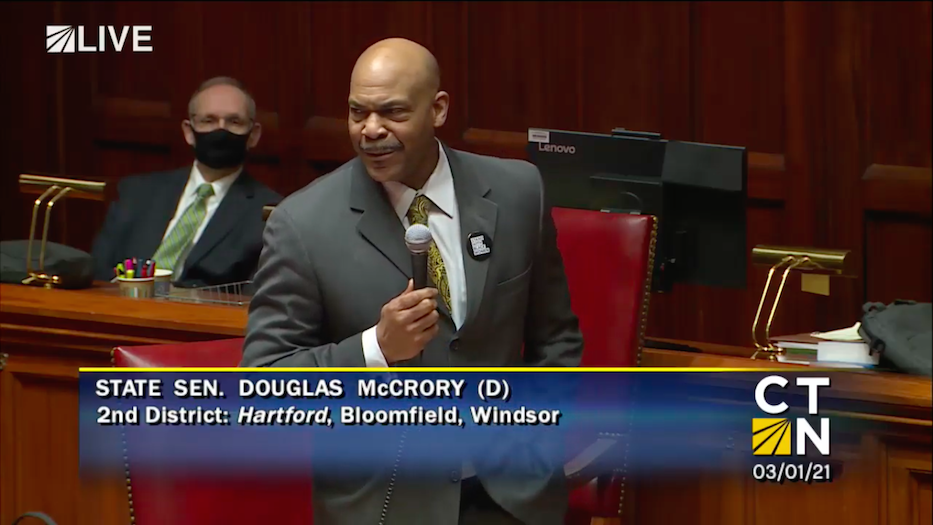
Toward the end of the debate, Hartford, Bloomfield and Windsor State. Sen Douglas McCrory looked back to the 1940s, when psychologists Kenneth and Mamie Clark first performed “The Doll Test.” In the test, conducted over several states, the Clarks lined up four dolls in order of skin tone, from white to black. Then they asked children to identify which doll was preferable and which was ugly.
Overwhelmingly, Black children chose the white doll as preferable, and the Black dolls as ugly. The experiment, one of the first to show hard data on American racism and internalized anti-Blackness in children, became pivotal in arguments for Brown v. Board of Education and desegregating American schools.
In 2010, psychologist Margaret Beale Spencer repeated the study for CNN, working with 133 children across eight schools. Four of the schools were in Georgia; four were in the New York metro area. Over 50 years and multiple U.S. Supreme Court cases later, test concluded the same bias toward lighter skin.
"This is cultural conditioning that was taking place for little Black girls and Black people in general,” McCrory said. “That your standard of beauty didn't exist. And your standard of beauty isn't beautiful. And we struggle with that."
He urged colleagues to vote yes on the bill. Moments later, a tally showed 33 votes in the affirmative. No one voted against the legislation.
"We’re gonna let our queens wear their crowns without prejudice," he said.


